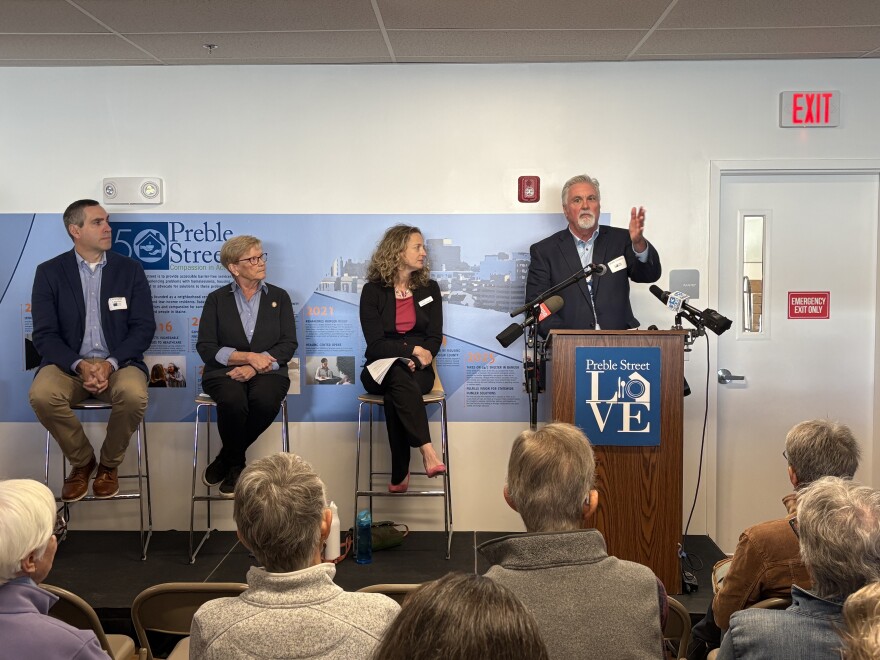Food security advocates gathered in South Portland Friday to celebrate the grand opening of a new industrial production kitchen run by the nonprofit Preble Street.
The 30,000-square-foot facility can create up to 2,000 meals a day, with the eventual capacity for up to 10,000 meals.
The freezer inside can store 50,000 ready-to-eat meals, which could be distributed statewide in the event of an emergency.
"Pandemics, natural disasters, these are things that we expect to happen, and we want to make sure everybody in Maine has food for that time," said Donna Yellen, vice president of strategic initiatives at Preble Street.
Yellen said the idea for the food security hub started during the pandemic, as Preble Street began making and distributing frozen, ready-made meals instead of opening up soup kitchens to large groups of people.
The produce for the meals comes from Maine farmers, donations and grocery stores with extra supply. The industrial kitchen employs two professional chefs, who have researched what frozen meals taste best after being heated up or traveling.
The new facility was funded through federal, state, county and municipal funding, as well as private donations, said Preble Street executive director Mark Swann.

Staff use hydrators and blast chillers to preserve the food that otherwise would have gone to waste.
"That allows us to extend the season of fresh fruits and vegetables for low-income people throughout the entire year," Yellen said. "It also allows us to be able to accept huge donations of food. In the past, we would only have been able to take a pallet of tomatoes or cauliflower, and now we have huge containers where we can keep them."
"Maine is one of the best farm-to-table states in the country," she added. "But until now, there's never been a farm-to-food-insecure ability."
The nonprofit, along with other advocates who came to celebrate the kitchen's grand opening, said the food security hub will be able to serve more people at a time where the need has never been higher.
Yellen said as the industrial production kitchen ramps up capacity, meals will be distributed more broadly to Good Shepherd Food Bank's network of pantries and other providers.
But advocates stressed that the hub can't replace the federal Supplemental Nutrition Assistance Program (SNAP) benefits, which about 170,000 people in Maine receive.
November benefits are at risk of being discontinued as the federal government shutdown drags on. Food security advocates and members of Maine's congressional delegation are calling on the Trump administration to find a way to distribute next month's SNAP benefits.
Speaking outside the Preble Street Food Security Hub Friday, Democratic U.S. Rep. Chellie Pingree of Maine's 1st District urged the U.S. Department of Agriculture to draw on contingency funds to pay for SNAP benefits.
"There is money there; we can do this any day of the week," she said. "But the idea that they are striking fear into families right now, that they are telling states don't even send us files, because we're not going to prepare them for the EBT transfers, is unconscionable."

Independent U.S. Sen. Angus King joined 45 Senate Democrats in calling on USDA to use contingency funds to pay for next month's SNAP benefits.
In a memo provided to Maine Public, USDA said it can't use contingency funds for regular SNAP benefits.
"The contingency fund is not available to support FY2026 regular benefits, because the appropriation for regular benefits no longer exists," USDA said.
Contingency funding must be available for other purposes, the department added, including disaster relief.
In addition, USDA said that if states choose to cover SNAP benefits instead, they will not be reimbursed.
Republican U.S. Sen. Susan Collins has cosponsored a bill that would appropriate federal funding for SNAP benefits during the government shutdown.
"As Congress works to resolve the needless and reckless government shutdown, passing this legislation to ensure that SNAP payments continue without interruption is a top priority," Collins said Friday in a statement.
Meantime, hunger in Maine is at highest level in a decade, said Heather Paquette, president of Good Shepherd Food Bank.
Food pantries are already being forced to make difficult decisions, she said.
"Pantry directors are needing to make impossible decisions such as limiting visits to the pantry, or restricting zip codes, which is an incredibly difficult decision that they should not be needing to make," she said.
Paquette said if SNAP benefits are not released next month, the state's emergency food network will be unable to absorb the increased need.




